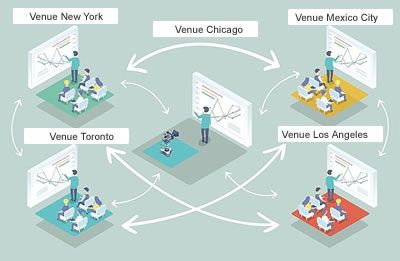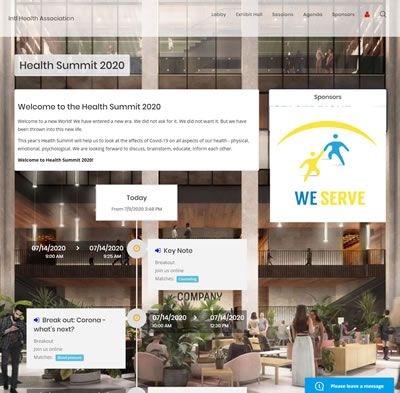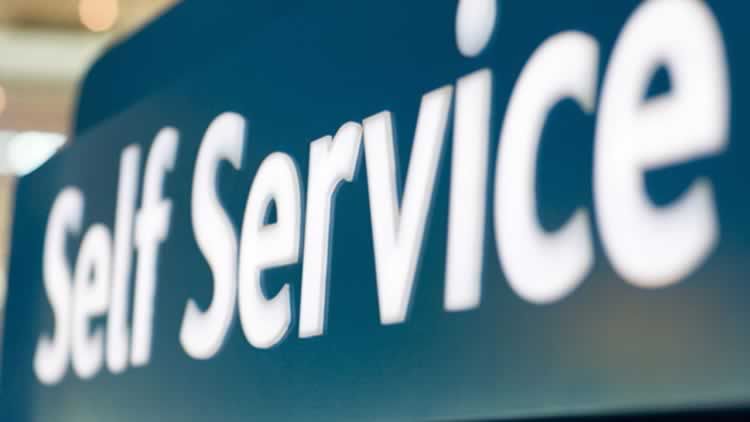2023 - What comes next for Event Planners
News & Trends
Looking ahead starts with looking back. How did we get here? Only then we can even imagine what comes next. So, let’s make a short list of anxiety-filled moments in the recent past:
- Covid terrified the country, making it come to a complete stop. The personal need to isolate yourself, wearing masks, being afraid of this virus has left a psychological mark on everyone.
- In-person events got cancelled. This led to virtual events being hastily scheduled as a replacement.
- Corporate offices closed, requiring staff to work from home.
- Zoom and Microsoft Team Meeting along with many virtual event platform start ups filled the gap of get togethers. Many platforms fell short of the high expectations such as immersive visual environments and networking. “Zoom fatigue” kicked quickly.
- In-person events came back.
- As a result, many virtual event platform start ups closed their doors partly due to an overreach in pricing.
- Corporate offices opened again. Companies try to revive the office life. Employees are not cooperating.
- People are traveling and mingling like there is no tomorrow. Flights, hotels are booked out regardless of prices. At the same time, the pace has changed. We all need more personal space than before. The cocooning period has changed us.
- Then our political polarization (here in the USA) has also contributed to angst.
- Let’s not forget inflation, the increased costs of living.
Did we forget anything that increased our blood pressure?
We have tried to analyze the profound impact of all mentioned moments on all of us, and how they shape the event industry going forward.
Here are our top 4 predictions:
1. In-Person Events are back
In-person events will continue their renaissance. Research shows that most people still prefer to attend physically (source: Linkedin ). The demand for onsite events will continue to grow exponentially. But they will change some formats. Organizers need to give attendees more personal space. Covid has made us more aware of our surroundings, other people in a close space.
Conferences will adapt to companies and leaders who are expressing symptoms of burnout through non-traditional scheduling that include more sensory-friendly quiet spaces, breakout rooms that incorporate wellness areas, health food catering, and even facilities for working parents.
Ironically, networking will also be more important than ever. People feel that they have lost valuable time to connect with others. Let us see how the event producers can bridge this gap.
2. Hybrid events will innovate the industry
 Several recent events indicate that the biggest winner in 2023 will be hybrid events. Hybrid events allow for the flexibility and reach of a virtual event, but the connection and engagement of an in-person option. We envision this market segment to grow fast. This will attract new start ups specializing in this complex event set up.
Several recent events indicate that the biggest winner in 2023 will be hybrid events. Hybrid events allow for the flexibility and reach of a virtual event, but the connection and engagement of an in-person option. We envision this market segment to grow fast. This will attract new start ups specializing in this complex event set up.
Hybrid events may not be a mere combination of an on-site show with virtual streaming components. There is tremendous room for innovation, the way where and how attendees can enjoy an event. We already see spider-like on-site events (see graphic) in different cities, all combined and streamed to a central virtual event. As illustrated in the graphic, think of one event being hosted in hubs worldwide, like New York, Toronto, Mexico City and London at the same time the virtual event creates the frame and overall experience. Regardless of your location you can join sessions everywhere and still mingle with people in your location.
3. Virtual events are shaping up
Virtual events have proven themselves to be a true alternative to on-site events in some cases. They allow promoters to target specific small audiences and cater more educational programs quickly and at lower cost. Organizations realize lower costs in most cases. On the vendor side, this will further thin the supply of platforms as license costs as part of overall costs will decrease. Gone are the days where event platforms are charging 10K or more for a 2-day virtual seminar.
 Welcome to “Micro Events” such as weekly webinars or group sessions. The medical industry and science-focused teams seem to be the front runner connecting often to share specific topics very efficiently and effectively. Over-the-top visual effects and “walking the campus” experiences will give way to the principle of “form follows design”, offering more efficient and user-centric features but less gimmicks. Pure Zoom events will also give way to a more robust experience. A simple video frame is just no longer enough.
Welcome to “Micro Events” such as weekly webinars or group sessions. The medical industry and science-focused teams seem to be the front runner connecting often to share specific topics very efficiently and effectively. Over-the-top visual effects and “walking the campus” experiences will give way to the principle of “form follows design”, offering more efficient and user-centric features but less gimmicks. Pure Zoom events will also give way to a more robust experience. A simple video frame is just no longer enough.
Online events are also redefining marketing. They are becoming a PR tool. Why not offering virtual sessions free of charge. Large companies have caught on, and are hosting free events, attracting 10x of attendees.
There is a flip side to this scenario as most event planners have realized. Revenue opportunities are decreasing. To recoup losses, many event planners have pivoted their strategies to include a longer-term ROI and robust sponsorships. Platform providers need to react offering more screen space for “credits” of sponsors. Also, event pricing may become tiered with a free main event and paid special sessions offering a value-add.
4. Remote Teams are here to stay
 Working from home has totally changed the workplace. And it has triggered a country-wide or even global migration of people. The newly coined label “digital nomad” explains best what is yet to come. There are many countries sponsoring resident visas to professionals who only need a laptop to work. Mexico, Barbados, Portugal, Spain and many more attract younger professionals, flexible to relocate.
Working from home has totally changed the workplace. And it has triggered a country-wide or even global migration of people. The newly coined label “digital nomad” explains best what is yet to come. There are many countries sponsoring resident visas to professionals who only need a laptop to work. Mexico, Barbados, Portugal, Spain and many more attract younger professionals, flexible to relocate.
Contrary to the wish of employers, remote teamwork is here to stay in some form or fashion. Empowered by technical innovations, and reshaped teamwork applications - Microsoft Team Meeting comes to mind – there is really no need to commute each day to an office only to do what you can also do in your home office: sitting in front of a computer.
You may wonder why we did not mention the “Metaverse” or “Augmented Reality”. The Metaverse has far to go towards being readily accessible for event organizers at a manageable cost. It, however, is one tool that we predict we'll be seeing a lot more in the years to come.
Plus, with the advancements of Artificial Intelligence (AI), Augmented Reality (AR) and Virtual Reality (VR), event organizers will be able more than ever to create other-worldly, personalized experiences for their attendees.
In the meantime, we wish everybody a healthy 2023 filled with more joy and less anxiety.
About Us: WEEcommunicate.com specializes in innovative customer engagement technologies. Our All-In-One Cloud Software Solution empowers organizations to market intelligently, increase lead-to-sales conversions, and reduce IT costs dramatically through our proprietary cloud technology platform. We offer an APP Suite with a full set of APPs to support most business models online at low cost.
Related
Address
WEEcommunicate.com
1231 Stirling Road , Ste 110
Dania Beach, FL 33004
USA








